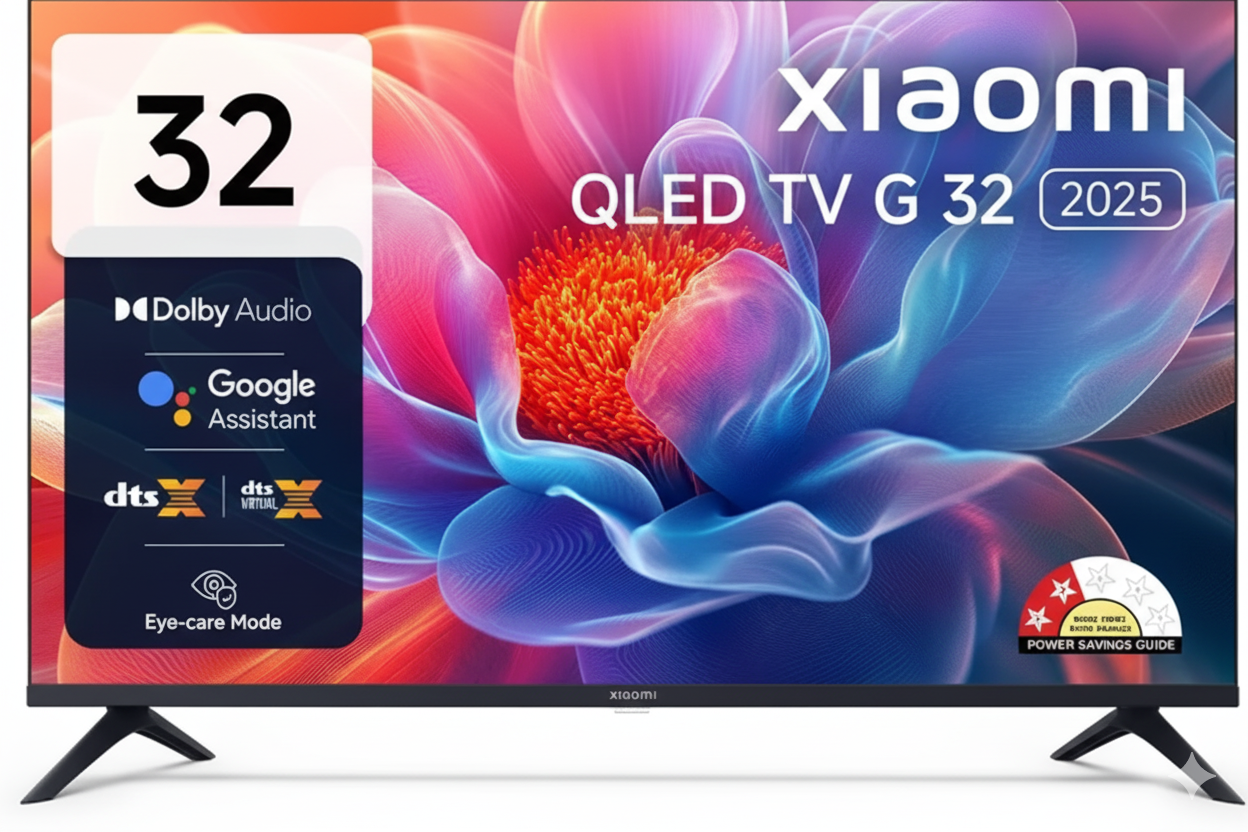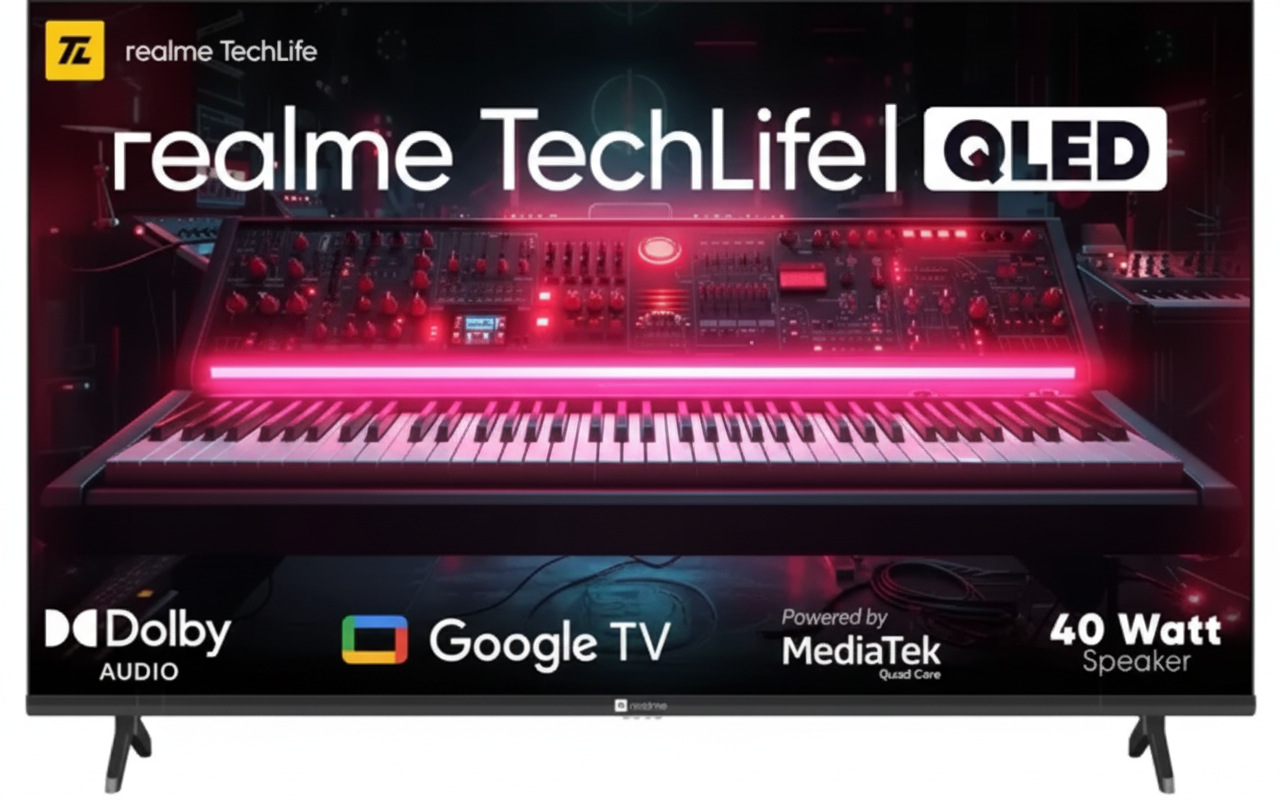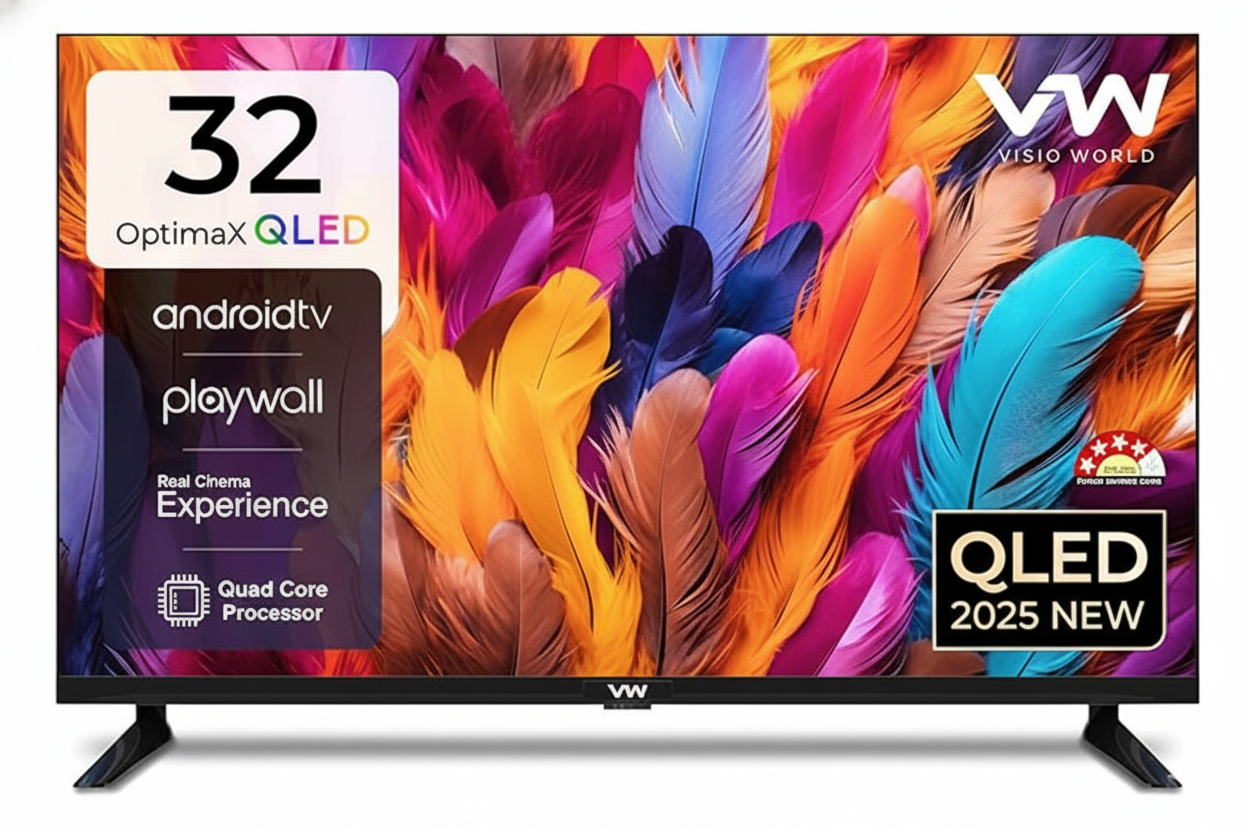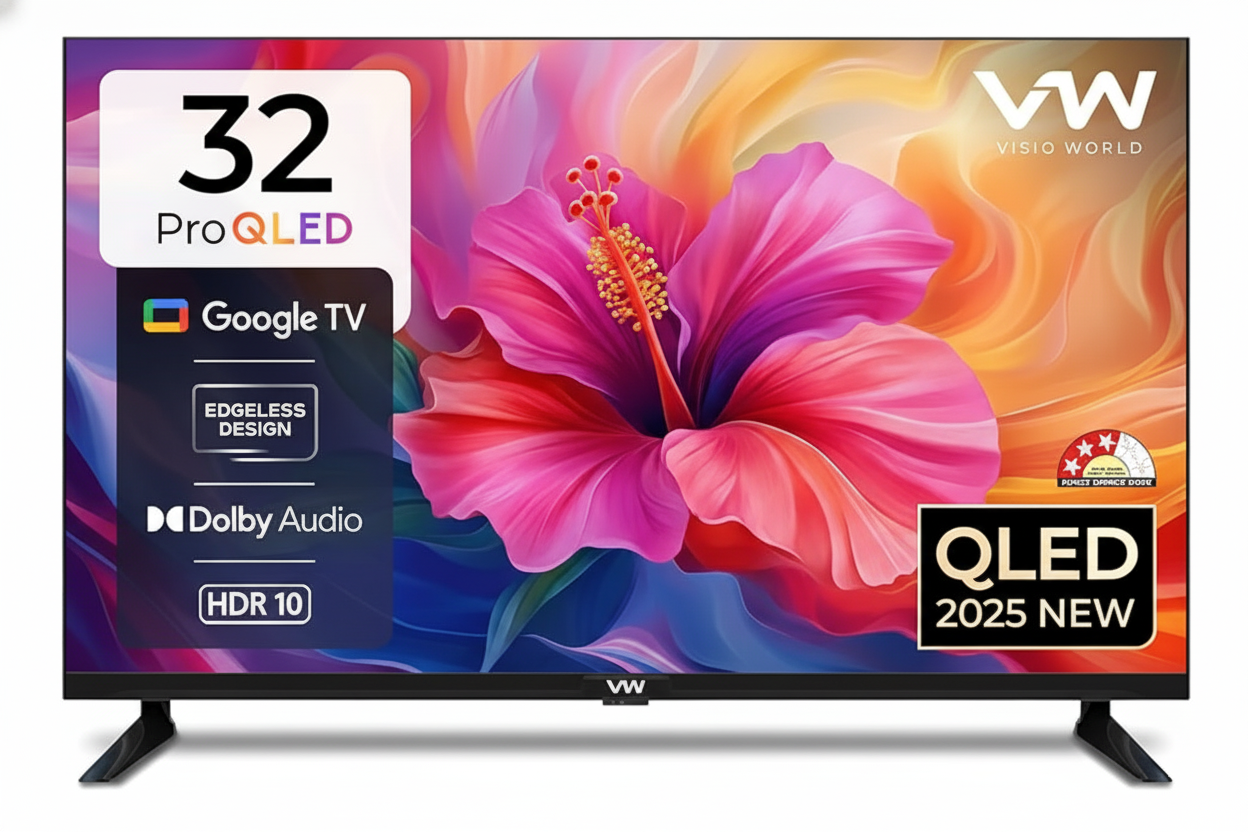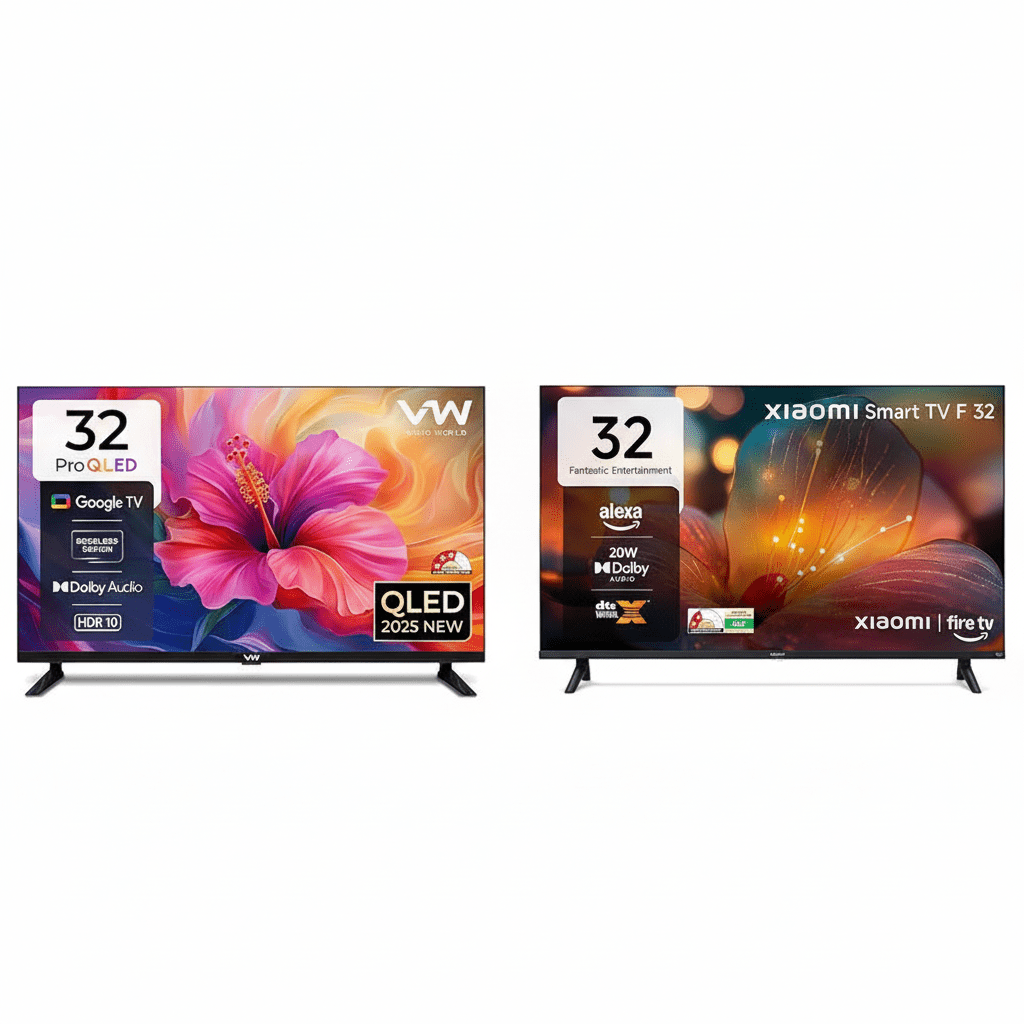
VW QLED vs. Xiaomi Fire TV (32-inch, 2025)
A showdown between two budget-friendly 32-inch smart TVs: Google TV meets Fire OS.
At a Glance
VW Pro Series QLED (VW32GQ1)
4.2/5 (429 Ratings)
- Price: ₹9,499
- Display: 32″ QLED, HD Ready
- Sound: 30W with Dolby Audio
- OS: Google TV
Xiaomi F Series Fire TV (L32MB-FIN)
3.8/5 (700 Ratings)
- Price: ₹10,499
- Display: 32″ LED, HD Ready
- Sound: 20W with Dolby Audio & DTS:X
- OS: Fire OS
Display: QLED Brilliance vs. Vivid LED
VW’s QLED Panel
The VW TV has a significant hardware advantage with its QLED display. This technology uses a layer of quantum dots to produce over 1 billion colors, delivering superior vibrancy, brightness (320 nits), and a wider color gamut. It also features HDR10 for enhanced contrast.
Xiaomi’s Vivid Picture Engine
Xiaomi employs a standard LED panel but enhances it with its Vivid Picture Engine. This software-driven approach improves clarity and color. While effective for an LED TV and supporting HDR, it cannot match the sheer color volume and peak brightness of the VW’s QLED technology.
Audio Experience: Power vs. Polish
VW’s 30W Speaker System
With a powerful 30-watt output from its high-fidelity box speakers, the VW TV delivers louder, more room-filling sound. This is a distinct advantage for movie watching and gaming, providing a more impactful audio experience without needing an external sound system immediately.
Xiaomi’s DTS Virtual:X Sound
Xiaomi’s 20W system is complemented by advanced audio formats, including Dolby Audio, DTS-HD, and DTS Virtual:X. This software processing aims to create a more immersive, 3D-like surround sound experience, even from just two speakers, which can be a compelling feature for audio enthusiasts.
Smart OS and Performance
VW’s Google TV Platform
Running on Google TV, the VW offers a content-centric interface with personalized recommendations, a massive app library via the Google Play Store, and built-in Google Assistant for voice commands. It includes 1GB of RAM and 8GB of storage for smooth operation.
Xiaomi’s Fire OS Experience
Xiaomi’s TV is built around Amazon’s Fire OS, making it a perfect fit for users in the Amazon ecosystem. It features deep integration with Prime Video and Alexa, and offers access to over 12,000 apps from the Amazon Appstore. It also includes 8GB of storage.
Connectivity, Design, and Warranty
Ports and Inputs
The port selection is nearly identical. Both TVs offer two HDMI ports and Dual-Band Wi-Fi. The Xiaomi TV provides two USB ports to VW’s one, while the VW includes a headphone jack, a feature missing on the Xiaomi.
Design and Build
Both TVs feature a modern, slim, bezel-less design that gives them a premium appearance despite their budget price. The choice here is purely down to aesthetic preference as both will look sleek in any setting.
Warranty
VW offers a superior 18-month warranty from the date of purchase. Xiaomi provides a standard 1-year comprehensive warranty. This gives the VW an edge in long-term peace of mind.
Specification Summary
| Feature | VW Pro Series QLED | Xiaomi F Series Fire TV |
|---|---|---|
| Price | ₹9,499 | ₹10,499 |
| Display Tech | QLED | LED |
| Sound Output | 30 Watts | 20 Watts |
| Sound Tech | Dolby Audio | Dolby Audio, DTS Virtual:X |
| Operating System | Google TV | Fire OS |
| USB Ports | 1 | 2 |
| Headphone Jack | Yes | Yes (Earphone Out) |
| Warranty | 18 Months | 12 Months |
Final Verdict & Recommendation
Choose the VW Pro Series QLED TV if…
…you want the best possible picture and sound for the lowest price. The QLED display and 30W speakers offer a clear hardware advantage. Combined with the versatile Google TV platform and a longer 18-month warranty, it represents outstanding value.
Choose the Xiaomi F Series Fire TV if…
…you are deeply invested in the Amazon ecosystem. The seamless Fire OS and Alexa integration are its main draws. It’s also a strong choice if you value advanced audio processing like DTS Virtual:X and need an extra USB port.
🏆 Overall Winner: VW Pro Series QLED
The VW Pro Series TV is the clear winner on value. It offers superior display (QLED) and audio (30W) hardware, a more versatile OS (Google TV), and a longer warranty, all at a lower price point. It is the better choice for the majority of buyers.
